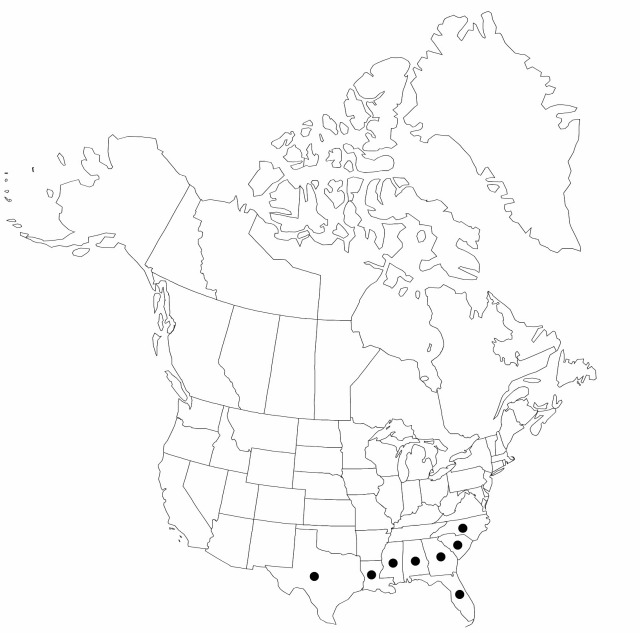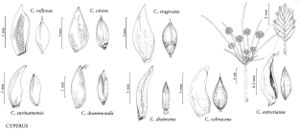Cyperus virens
Fl. Bor.-Amer. 1: 28. 1803.
Herbs, perennial, cespitose; rhizomes 0.5–2 cm, often absent. Culms trigonous, (20–)60–70(–100) cm × 2.4–6.9 mm, scabrid on angles. Leaves 4–12, flat to V-shaped, with readily visible cross ribs especially on abaxial surface, 20–50 cm × 3–14 mm. Inflorescences: heads digitate to hemispheric, 1–3.5 cm diam.; rays 6–12, 1–9(–14) cm; 2d order rays often present, (0.5–)1–3 cm; 3d order rays occasionally present, 5–12 mm; bracts 4–8, horizontal to ascending at 30°, with prominent cross ribs,V-shaped, (1.5–)3–50(–75) cm × 0.5–13 mm; 2d order bracts 3–10 × 1–2 mm. Spikelets 10–40(–50), oblong to linear-lanceoloid, 5–18 × 2–3.2 mm; floral scales 10–40, pale grayish brown, or greenish, proximally greenish or brownish, oblanceolate, 2-keeled, weakly to distinctly 1-ribbed, proximal half 2-ribbed, (1.3–)1.5–2(–2.4) × 0.9–1.4 mm, apex acute (sometimes mucronulate), apically glabrous, occasionally scabridulous. Flowers: stamens 1–2; anthers 0.8–1.4 mm; styles 0.8–1 mm; stigmas 0.6–0.8 mm. Achenes brown, slightly to distinctly stipitate, ellipsoid (2.7–4.1 times as long as wide), (0.9–)1.2–1.5 × 0.3–0.4 mm, apical beak 0.1–0.5 mm, surfaces glabrous.
Phenology: Fruiting spring–fall.
Habitat: Wet pastures, marshes, roadside ditches
Distribution

Ala., Fla., Ga., La., Miss., N.C., S.C., Tex., Mexico, Central America, South America.
Discussion
Cyperus virens was found as waif in California in the 1800s (M. F. Denton 1978b; G. C. Tucker 1993b).
Cyperus virens is readily distinguished from other species of subg. Pycnostachys by its trigonous culms, scabrid angles, and leaves and inflorescence bracts conspicuously septate by numerous cross ribs between the main ribs.
Selected References
None.
